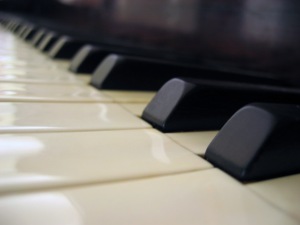And then she was in pain, confused and aching and she thought she was on the birthing bed again. She felt like she was being split in two, but she could not feel the enveloping softness of a hospital bed. It felt cold all around, like a winter night.
Back to being a little girl, sitting with her bottom firmly planted on the piano stool this time, feet stretched to touch the pedals. Ms. Lancaster sat on the chair behind her, imperiously staring into her back. On top of the piano, a metronome ticked. One-two, one-two. One-two, one-two. She played the notes written out on the scoresheet in front of her, all in proper time. Then Ms. Lancaster turned off the metronome and she played again only this time she knew she was getting the time wrong because she had not internalized it, not learned to measure and understand Time and let its rhythmic passage sink within her and so Ms. Lancaster got angry and scolded her and she just sat there and took it and promised herself she would do better next time.
And suddenly she was sitting on a park bench next to a reedy, somewhat awkward young man watching other young men play rugby on Pontcanna Field while she talked softly and stared at the carpet of brown and gold and crimson leaves spread around them, all rich with color and stiff with death.
And then she was cold again and hurting again and though she could see swathes of light she could not form shapes out of them. She could not hear at all. She was trapped in cold soundless pain yet in this still emptiness, desperate though she was for something greater, she could feel the familiar rhythm, the passage one-two, one-two that moved forward inexorably, always at the same pace, no matter when or where or what she was.
Suddenly, back to the music room. A violin in her arms this time, Mr. Hunt and his boys arrayed around her, all of the youths staring into their music stands. They began to play and Ellie strove to stay as one with them, to bring order and rhythm and coherence to four disparate players. She has never liked playing with other people. They never learned to move with time as she had.
And then she was with George in their flat on Oxford Road. She had just returned from the hospital. Together they leaned forward with Rose in their hands and set her down in her crib for the very first time.
And then she was playing again, fresh from school and still in her uniform, practicing in her room while the house was empty and autumn raindrops pounded on the glass of her bedroom window without any rhythm at all
She was sitting down to dinner with her mother and father and brother, not really paying attention to either, when the familiar banshee-wail of sirens rose over the city.
She was blind and deaf and dying again, her life flashing before her eyes.
She clutched the sweat-soaked sheets of the hospital bed, her body splitting open to let another one into the world.
She was buried in the rubble of her home on a frigid January night after flinging herself on top of Rose when the kitchen around her crumbled.
She was lying in a white hospital bed, not quite sure where she was, the only constant in her awareness the endless unstoppable drum-beats of Time.
She was standing with George on the crest of Hartshead Pike, looking down on the fields on the first day of spring, the sun and the wind in her face and the strong arm around her shoulders all promising something rich, something exciting, something warm, something new.
And finally she was a little girl, one last time, sitting on the piano stool with Ms. Lancaster sitting behind her, the metronome resting mute atop the piano. Ellie played the notes as she always did, for the first time without the metronome because, after long long hours of practice and self-discipline and self-scolding whenever she let her time waver, she had finally mastered the rhythm one-two, one-two, internalized it at last, never to need a metronome to count out time for her again. The beats had become something she could sink into and out of but it would always be there, always ticking away in the back of her head. She knew time and she knew it would always be with her, through childhood and youth and into adulthood and finally to death, because she knew time in all its invincible forward movement and from that young, young age she knew that time devours all.

Leave a Reply